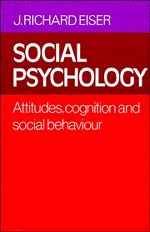8 - Justice, roles and obligations
Published online by Cambridge University Press: 05 July 2011
Summary
The notion of equity
An emerging theme throughout the last few chapters has been the extent to which individuals judge their outcomes from an interaction in comparison with what they feel they deserve. This is implicit in Nuttin's (1975) challenge to cognitive dissonance theory, with regard to the finding that inequitably high or low rewards for a task can lead to ‘dissonance’ effects. It is implicit in the definition of comparison level (CL) proposed by Thibaut and Kelley (1959; see Chapter 5, p. 130). The importance of the concept of deservedness for social psychological theory may be difficult to over-estimate. It allows us to deal with the fact that individuals decide on a course of action at least partly because of what they expect to get out of it, but does not require us to assume that the law of effect applies to social interaction deterministically and without regard to personal norms and values. It allows for a motivational analysis, but also enables the relevant motives to be treated as potentially under cognitive control.
Stimulated by such considerations, researchers have recently paid increasing attention to the issue of how people judge what is just, fair, deserved, or equitable, and how such judgements influence behaviour. Corporately this research has adopted the name of ‘equity theory’. At present, however, the ‘theory’ consists for the most part of rather loosely formulated predictions and generalizations, and is in need of more precise definitions and empirical validation (Berkowitz and Walster, 1976).
- Type
- Chapter
- Information
- Social PsychologyAttitudes, Cognition and Social Behaviour, pp. 253 - 293Publisher: Cambridge University PressPrint publication year: 1986



